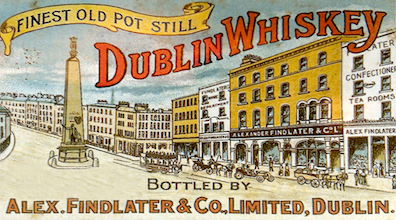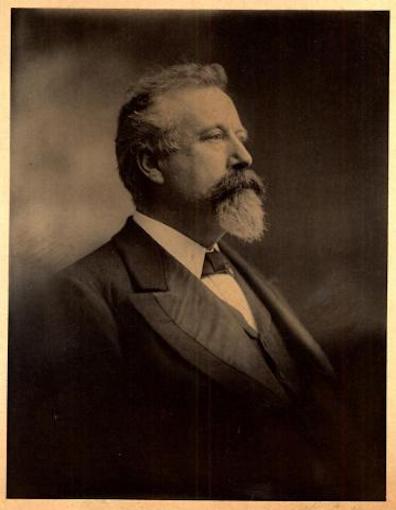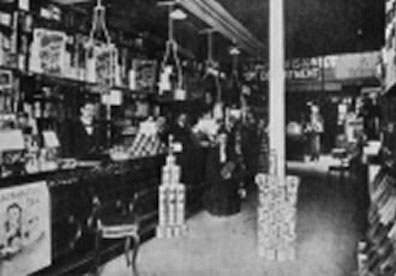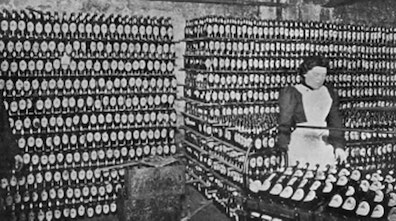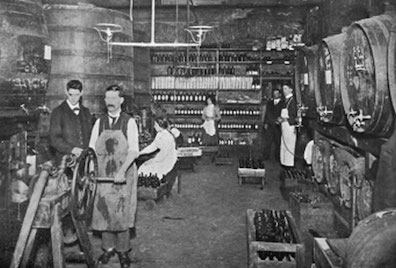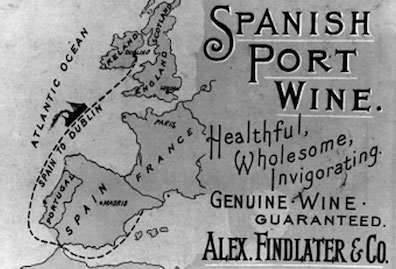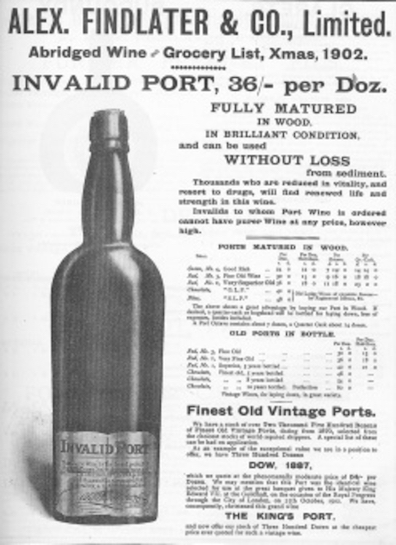In Penelope Molly thinks of buying flowers the next
morning from "Lambes there beside Findlaters." Miss Alicia
Lambe ran a florist's shop at 33 Upper O'Connell Street, next
to the massive Findlater's business at numbers 29-32, which
sold Irish and English whiskeys and ales, French and German
wines, Spanish ports, dry grains, boxed and bottled fruits,
baked goods, spices, teas, cocoas, roasted coffee beans, oils,
honeys and syrups, jams and jellies, pickles, anchovies,
smoked bacon, eggs, butter, produce, and much more. Earlier,
in Calypso, Bloom thinks of one of the prominent
family owners of the company when he imagines poor pub servers
from the country blossoming into "Adam Findlaters or Dan
Tallons." Far from starting poor, Adam Findlater was born into
a long-established and thriving company, and he capably
contributed to its continuing expansion.
Founded in 1823 by Alexander Findlater, an enterprising
Scotsman, the business's main premises were on Upper Sackville
(now O'Connell) Street, but by 1904 there were branch offices
scattered throughout the city and its suburbs: Leinster
Street, South Great George's Street, Upper Baggott Street,
Thomas Street, Blackrock, Foxrock, Sandymount, Kingstown,
Howth, Rathmines, Dalkey, Bray. The voluminous family website
at www.findlaterbook.com devotes a chapter to Adam S.
Findlater (1855-1911), who was educated at Trinity College
(B.A. 1876, M.A. 1889) while working in the family business.
As managing director (his elderly father John was still the
Chairman in 1904), Adam brought considerable learning and also
hard-nosed financial instincts to the running of the firm,
overseeing steady growth. He also had ownership stakes and
management responsibilities in Dublin hotels, theaters, and
distilleries.
In addition to some notable charitable enterprises, Findlater
was deeply involved in local politics. He served on the Dublin Port and Docks Board
and Dublin Chamber of Commerce, and he chaired the town
commission of Kingstown at a time when that rich suburb
undertook many civic improvements. When the gathering strength
of the Home Rule movement in
the 1880s prompted conservative business people to organize
politically as unionists, Findlater became an articulate
proponent of liberal unionist causes, advocating reforms with
which moderate nationalists might agree. Thornton notes that
the United Irishman,
Arthur Griffith's newspaper,
characterized Findlater as "kowtowing to the English in hope
of some preferment," encouraging "foreign manufacture in
Ireland," and "begging for a knighthood."
Although the store on Upper O'Connell Streets is mentioned
only once in the novel, its branded products would have been
all over Dublin in 1904. The port and sherry wines recalled in
Lestrygonians and the Bass Ale consumed in Oxen of
the Sun seem especially likely to have a Findlater's
connection.
